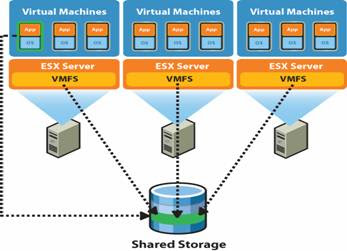Managing storage in clustered and/or virtual environments can be challenging because it is shared among all hosts and virtual machines running on it.
Below is an example of a VMware cluster, just a simple 3 node cluster going to
some shared storage.
Features
that are available
•
Thin provisioning
•
Storage can be viewed at many levels.
•
Could be different tiers allocated to the same cluster
•
Overhead at various points
gives you a good indication of your overhead.
Storage Virtualization
There are
advantages to the layered system
• It allows a caching layer so that you
may not have to go all the way to the backend to satisfy an I/O request
• There are a lot of administrator
features regarding allocation and replication, pooling physical storage from multiple sources into
logical groupings is useful
•
Can be a centralized source for collecting data
•
If using as a data source beware of double counting
with backend
There are a wide variety of techniques for
virtualizing storage, be aware of the implications for data collection and reporting.
On Monday I’ll be discussing response impacts on
performance capacity and metrics for these.
Follow our blog to get updates sent directly to you.
Follow our blog to get updates sent directly to you.
Dale
Feiste
Principal
Consultant



No comments:
Post a Comment